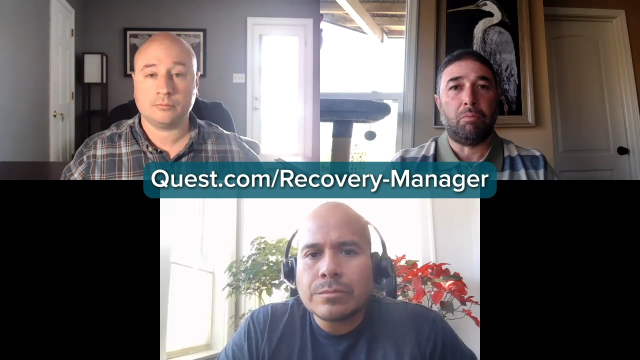How do you protect against ransomware? We’ll show you.
 05:22
05:22
Related videos
Protect AD Backups from Malware Infection
Learn how to protect Active Directory backups from malware infection with Recovery Manager for Active Directory, Disaster Recovery Edition.
09:10
Comparing Flexible AD Recovery Options
Active Directory disasters require flexibility in recovery because no two environments or attacks are alike. Learn about the Recovery Manger restore options.
07:36
How to respond to an Active Directory disaster with Recovery Manager
Learn what happens when Active Directory disasters strike when you’re protected by Recovery Manager for Active Directory, Disaster Recovery Edition.
04:54
Recover Active Directory 5x Faster with Quest Recovery Manager
To combat increasingly clever hackers and their ransomware, your organization needs to be able to backup/rapidly recover its Active Directory infrastructure. ...
02:43
Overview of Recovery Manager for Active Directory
This video provides an overview of Recovery Manager for Active Directory.
04:55
How to configure and manage backups in Recovery Manager
How to configure and manage backups in Recovery Manager for Active Directory, Forest Edition, and Disaster Recovery Edition.
13:23
Highlight Reel! Quest at Microsoft Ignite 2018
Relive the fun. Revisit the people. Watch this quick recap of the fun and excitement at Microsoft Ignite brought to you by Quest.
01:35
Active Directory Recovery Made Easy
Learn how you can protect your Active Directory data from disaster, reduce downtime, and perform granular restores with Recovery Manager for Active Directory.
02:33
How to set up integration between Recovery Manager for AD and On Demand Recovery
Learn how to set up integration between Recovery Manager for AD and On Demand Recovery
01:52
How to create a forest recovery project in Recovery Manager for Active Directory
Learn how to create a forest recovery project in Recovery Manager for Active Directory.
09:47
How to use and navigate the Recovery Manager for Active Directory portal
Learn how to use and navigate the Recovery Manager for Active Directory portal.
06:14
Reduce your recovery time from a Forest-level Active Directory disaster by 95%
Active Directory is at the heart of businesses around the world. Microsoft estimates that there are more than 473 million Active Directory accounts that authen...
01:06
